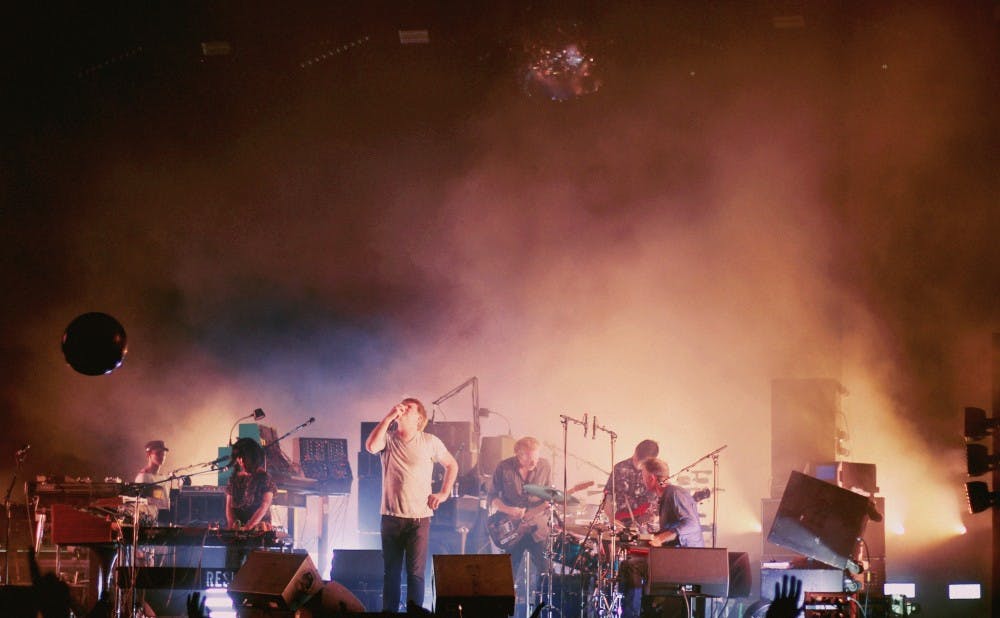Barely two weeks after LCD Soundsystem released their first song in more than five years, “Christmas Will Break Your Heart,” David Bowie, the idol of LCD mastermind and sole consistent member James Murphy, died.
Murphy memorializes Bowie on LCD Soundsystem’s new album, “American Dream,” with the closing track “Black Screen,” in which he expresses his profound regret that he failed to make more of their shared time. (Murphy was a collaborator on Bowie’s final album “Blackstar,” released just before he died.) The song, twelve minutes long, is paced by a pattering drum beat and pulsing, booming synthesizer—synthesizers which channel some of the more ambient and inaccessible portions of Bowie’s Berlin Trilogy—before it spirals into an ambling keyboard outro that concludes the album.
That Murphy would be so clichéd as to conclude his band’s first studio album in seven years with a borderline sappy ode to one of his heroes (Murphy holds only Lou Reed in higher regard) should not be surprising, as LCD Soundsystem’s discography is constructed in large part upon allusion and homage to legends such as Bowie, Reed, New Order, Talking Heads, Can, Brian Eno and a myriad of other artists.
What makes Murphy’s clichés so audacious, however, is how he can fall victim to them for four straight albums and still make them sound fresh and new—even after leaving his listeners with seven years to ruminate on them. On “American Dream,” LCD does not change, retains the same magic that gave the band’s first three albums such acclaim.
The opener, “Oh Baby,” wastes no time in hitting the listener hard with heartbreak and manages to incorporate some of the best aspects of two of LCD’s most (rightfully) famous songs, “All My Friends” and “Someone Great.” After a minimalist industrial drum part that further simplifies the famous two-note piano intro to “All My Friends,” rich synthesizer trills back Murphy’s heartfelt vocal—at the end of the song, “[His] love life stumbles home.” Rich and plainly sung so as to make its lyrics universal, it could have been lifted straight out of the opening credits of a John Hughes movie.
In a seven years of absence, Murphy seems only to have grown more and more self-referential, as several songs on American Dream echo earlier LCD classics. “Tonite,” one of the most conventional dance songs on the album, has the same intentionally shallow sound and almost spoken word vocal as “Pow Pow,” off 2010’s “This Is Happening,” all over gaseous bass synth that hearkens back to the band’s eponymous 2005 debut.
Better yet, “Other Voices” sounds like “Sound of Silver”’s “Us V Them,” and channels the same paranoia. Murphy repeatedly rasps a pseudo-chorus of “You’re still a pushover for passionate people” over cowbell and blistering synthesizer until more-or-less full-time band member Nancy Whang delivers a soulless monologue that sounds like a third-person narration of the band’s break-out hit, “Losing My Edge.”
Other songs seem to tread new ground before retreating to familiar sounds, with the ominous “How Do You Sleep?,” a taunt ostensibly aimed at the co-founder of Murphy’s label DFA Records, Tim Goldsworthy. Over post punk-flavored tribal drums, sparkling arpeggiator and tremolo strings, Murphy screams about—what else?—his regrets and memories of a past acquaintance. Eventually, booming synths enter the song before a clattery, snare-heavy drum track lifted straight out of “Dance Yrself Clean” slaps itself into shape to turn the nine-minute opus into a dance track.
Other highlights include the single “Call the Police,” a bass guitar-driven song that sounds like the natural evolution of some of the shorter punk songs found on the band’s debut. A cascading guitar line anchors the song, while Murphy’s admittedly high-and-low lyrics reference Neil Young (“We all, we all, we all, we all know this is nowhere”), wryly comment on gender roles (“Wear your makeup like a man”) and questionably mention how arguing about Jewish history “gives him the blues.”
Despite the familiarity of sounds on the album, Murphy’s infectious hooks and wry lyrics give new life to what could easily have been a mailed-in, retread reunion, and result in what may be the band’s strongest work to date. The same LCD Soundsystem that left the public eye six years ago fell right back into what they were famous for doing with “American Dream,” and hardly missed a step.
Get The Chronicle straight to your inbox
Signup for our weekly newsletter. Cancel at any time.

